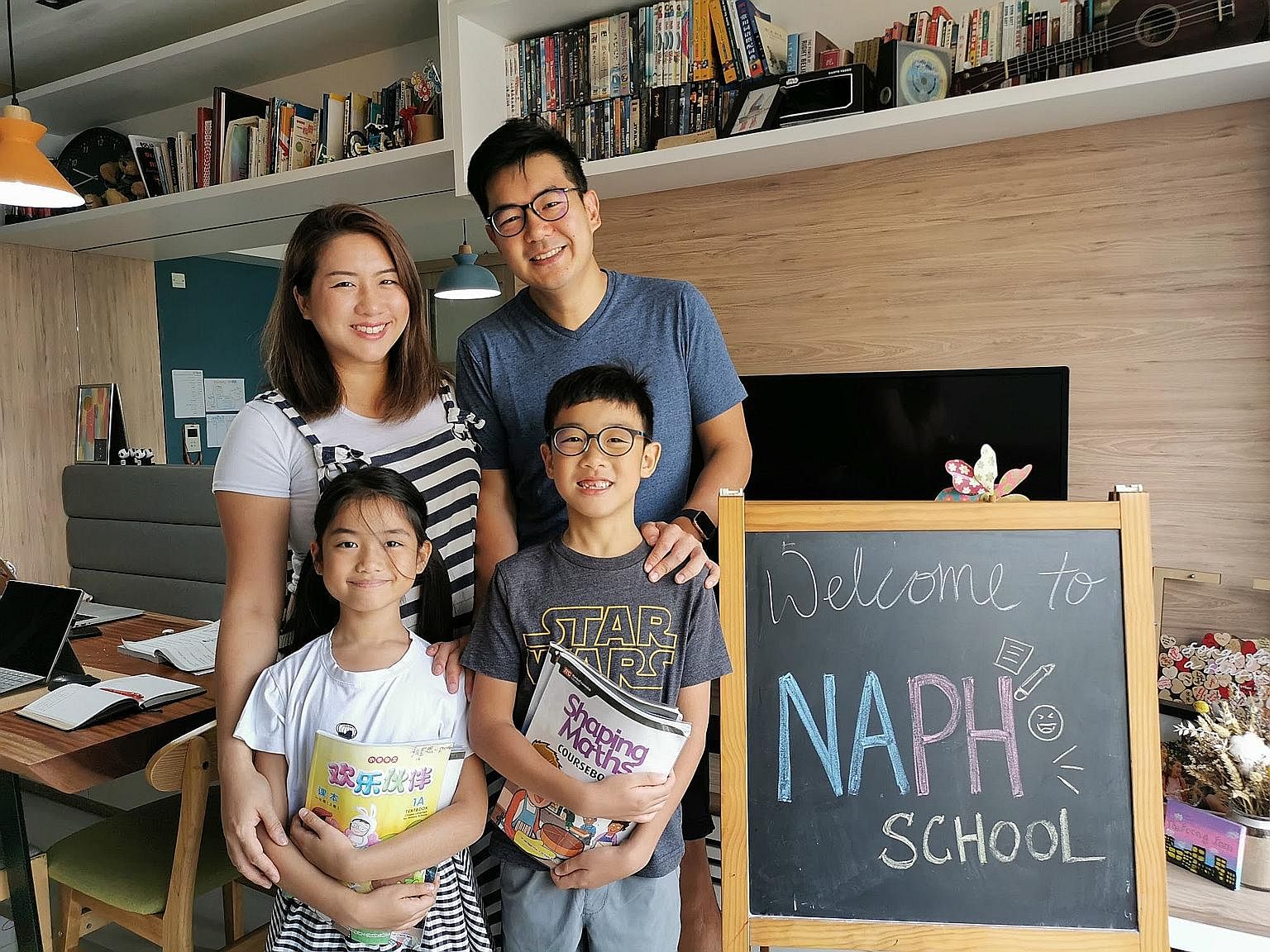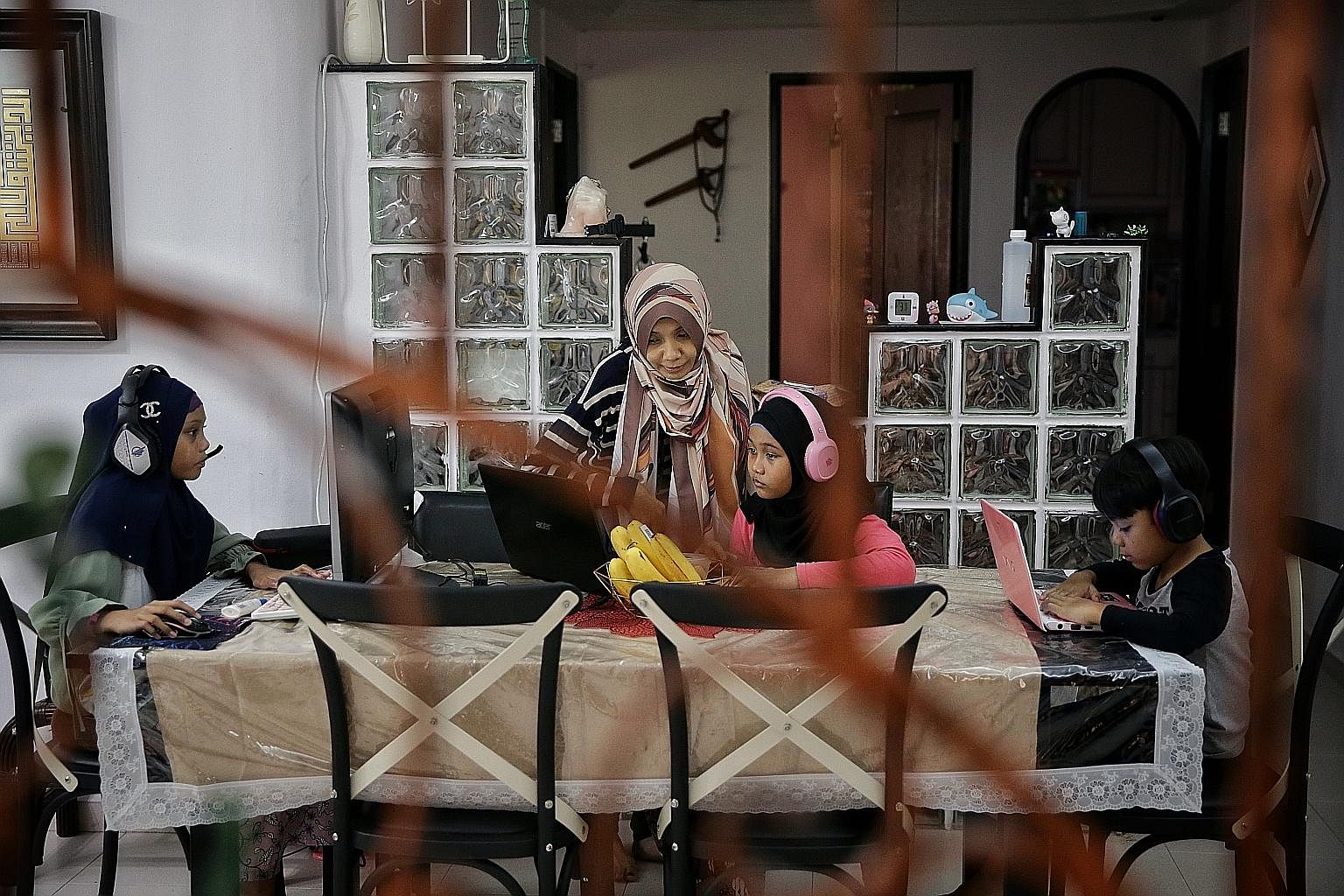Siblings Nathan and Phoebe Foong have been waking up for school, where they stand at attention for the National Anthem during assembly before heading to the canteen.
The catch? They are actually at home.
Their parents, Mr and Mrs Elvin and Esther Foong, devised "Naph School", an amalgam of the first two letters of the children's names, after the family was asked to self-isolate under a leave of absence (LOA) request.
The family's LOA was issued after their trip to visit Mrs Foong's father in Johor during the recent March school holidays. Nathan, nine, and Phoebe, seven, will return to school on Thursday.
According to the Education Ministry, less than 10 per cent of students and staff, across all schools, are on LOAs or stay-home notices (SHN), which aim to prevent the spread of Covid-19. They are both 14-day self-isolation measures, typically following overseas travel.
Some families with young children are concerned about supporting their offspring's learning away from school.
Some, like the Foongs, are finding that the enforced time at home can be bittersweet, bonding the family together, while laying bare other fissures and flaws.
Mr and Mrs Foong run a tight ship at Naph School, where the "school day", which has regular breaks, ends around 2.30pm, after which the kids have scheduled activities, such as a nap and screen time, until dinner at 6.30pm.
The menu at Naph Canteen, which comprises a single table in the balcony of their flat, offers a set breakfast and lunch at $1.20, as well as 60-cent snacks such as small buns and yogurt.
Drinks are 40 cents for every half -cup, though the kids get a credit of 10 cents if they finish a bottle of plain water, which is free.
Mrs Foong, 35, says she and her husband started Naph School because they wanted the children to have a similar structure to their days.
"The more formally you treat it, the more the children will see how serious you are," says Mrs Foong.

She and her husband, 38, run their own business, The Treasure Box SG, which provides resources such as storybooks and activity kits for families based on their Christian faith.
But recreating school at home has its downside.
Mrs Foong says: "Especially in the area of our children's behaviour and learning abilities, parents may be confronted with situations that make us realise that our children are not who we thought they are, or that they are not meeting our expectations and standards of who and how they should be."
The proximity of self-isolation "amplifies" the areas that need improvement, which can be a painful realisation, she says.
For instance, they realised from running Naph Canteen that Phoebe, who is in Primary 1, has difficulty counting and understanding dollars and cents.
Mrs Foong adds: "For Nathan, we realised he seeks help too fast. Once he meets a challenge in his work, his first thought is to ask for assistance.
"We have been coaching him to attempt a question again, to try to read it again, to highlight the key words and to think of other ways to solve the problem."
Mr and Mrs Foong realised that they had to learn to be more patient with their children. They have also taken the opportunity to use their time together meaningfully.
"We listed the skills we wanted to learn. The children learnt to play pick-up sticks and papa has taught Nathan Chinese chess," says Mrs Foong.
Experts say that parents need not be overly anxious about taking the place of the child's teacher at home.
Dr Tan Seng Chee, an associate professor at the National Institute of Education, Nanyang Technological University, says: "The home environment is different from a school environment in terms of resources, expertise and the social environment.
"Trying to emulate a school environment may not always work.
"Some parents may not feel confident about teaching the subjects taught in schools, while some parents may equate teaching to lecturing - but lecturing is only one of the many ways to help children learn."
In fact, by gaining insights into their children's learning styles, like the Foongs did, parents would be able to better support their children, Dr Tan says.
"Parents can take this as a good opportunity to know their children better and build a stronger relationship with them," he says.
But another mother under LOA, religious teacher Suriah, 37, cannot help but feel anxious about her three children being away from school.

She enrolled her oldest daughter, Farah Syifah Mohammad Fadillah, 12, in online LOA classes provided by Cherrr, a learning platform that offers livestreamed tuition lessons and ensures her second daughter, Fathia Sofiyya, nine, does her homework online and assessment books.
She even prepares worksheets for her six-year-old son, Fathi Syauqi, who is in the second year of kindergarten.
"I don't want them to be left behind when they go back to school. Fathia is in Primary 3, where there are exams, and Farah is in Primary 6," says Ms Suriah, who is serving LOA with her children following a trip to Johor.
She is married to a 39-year-old assistant maintenance engineer in the micro-electronics sector.
She recalls finding it hard to catch up on her studies as a private A-level student in 2003, when Sars struck and school was suspended for a while.
She finds time management to be the biggest challenge under self-isolation, finding time for herself only after the children go to sleep. She once stayed up till 5am to do her own work.
Still, she ensures the children stay healthy with their silat training exercises twice a day, and is staying positive.
"If you think positively, it can change how you act," she says, adding that she relieves the tensions of self-isolation by talking to fellow mums in WhatsApp group chats.

